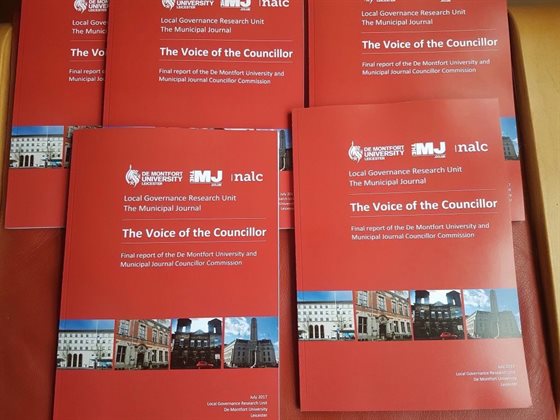Fundamental changes are needed to improve the roles of councillors serving communities in England, academics have said. More needs to be done to strengthen the office of councillor, with key areas for improvement including more access to information, better training and changing public perceptions of the job.

The Voice of the Councillor is a report published following a year-long inquiry by De Montfort University Leicester (DMU)’s Local Governance Research Unit and The Municipal Journal. It recommends a series of steps to improve the office of councillor which, argue the researchers, would make it far more effective.
Professor Colin Copus, head of the LGRU and co-author of the report, drew on the report this week as he gave evidence to the Communities and Local Government Scrutiny Panel at the House of Commons.
He said: “We ask much of our councillors but often seem reluctant to balance that with supporting them or developing a clear understanding of what they do and of the limitations on their office they must overcome. It was the aim of the commission and of the final report to redress that balance.”
More than 300 councillors took part in round table discussions, across England where they spoke about their roles, work, the pressures and frustrations they face and what they felt was needed to strengthen what they do. In addition, 128 written submissions were received and councillors also shared their views on social media. It was the first study of its kind, for some years, to visit councillors across the country and ask them about their experiences of being a councillor. In addition, the National Association of Local Councils conducted a survey of its members and parish councillors also made a major contribution to the round table discussions.
The report found:
• Councils were not providing enough information to councillors for them to properly do their jobs. In some cases, councillors were submitting Freedom of Information requests to their own councils for information
• Action is needed to increase diversity among councillors so that councils better reflect the communities they represent
• A proper system of support training and development should be implemented
• Workload was increasing, as were the range of organisations councillors were expected to deal with, including companies, private and public agencies
• Councillors were frustrated that members of the public thought they had more powers and responsibilities than they did
• Councillors were not given adequate support from staff working in the council’s administrative, technical or policy departments
The authors say there should be an independent inquiry into councillor expenses and time off in lieu for public duties.
One county councillor told researchers they worked every day of the week, weekends and evening meetings, saying: “I believe there must be a recognition of the type of work, and the volume of work and the level of responsibility there is here.”
RELATED NEWS:
* Discover more about DMU at our next open day
* Council work rewarding - but councillors lack social life
Prof Copus added: “Councillors are not craving praise or even recognition for what they do, rather they expect their office, its roles, functions, powers, responsibilities and, importantly, its limitations to be recognised and accounted for by those with whom they interact.”
Rachel Wall, researcher to the commission and a co-author of the report, commented: "The parish stream of the commission, supported by the National Association of Local Councils and Cllr Mike Evans, was particularly important for me – having served as a parish councillor I understand the frustrations we heard, and the complex relationships between parish and town councillors and principal authorities is still not fully understood. I hope the report and recommendations it contains are able to help drive that conversation forward."
The project was supported by the Chair of the Communities and Local Government Committee, Clive Betts MP. The intention of the report is to inform national and local policy debate and local practice so as to strengthen the office of councillor.
Posted on Wednesday 25 October 2017